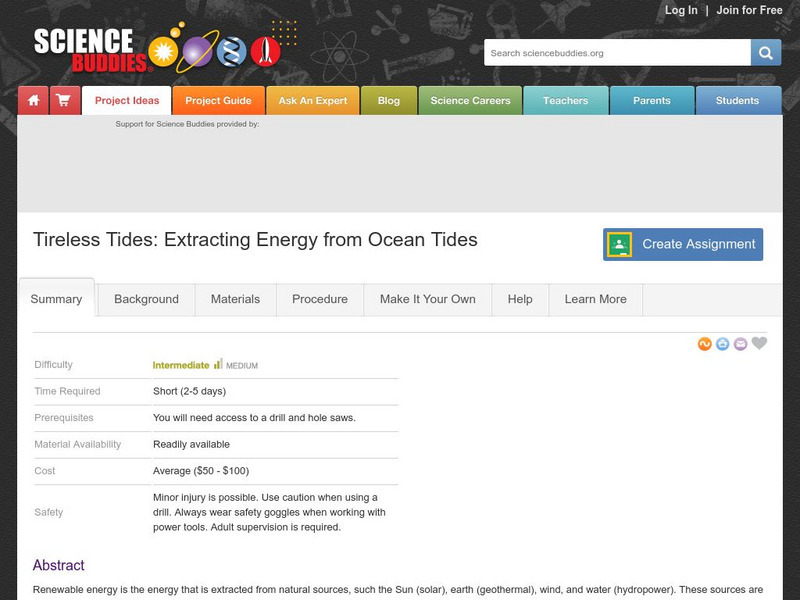Hi, what do you want to do?
Curated OER
The Hudson's Ups and Downs
Even rivers have tides. Older elementary schoolers will discuss the Hudson River and how weather, water craft, and the ocean cause tidal fluctuation. They will examine a series of line graphs that depict tidal fluctuation, then analyze...
Curated OER
The Intertidal Zone: Tides and How Creatures Survive
Learners study the properties of ocean water and tides and learn about animals that live in intertidal zones. In this intertidal zone lesson, students participate in classroom stations to learn about fresh water and salt water, cold...
Curated OER
Ocean Habitats:
Students investigate the creatures of intertidal zones. They explore the adaptations species make to survive .
Curated OER
Lesson one
Students study waves and how it erodes a beach. In this energy lesson students complete a lab activity on waves and tides.
Curated OER
How Do Waves Change a Beach?
Students conduct an experiment on beach erosion. For this earth science lesson, students create a beach model and use tongue depressor to produce waves. They write a journal about their observations.
Curated OER
How Does the Moon Affect Tidal Range?
Eighth graders study the phases of the moon. In this tides lesson students use the Internet to retrieve information.
Curated OER
Where Are All the Fish?
Students identify the problems that marine life is facing today. In this marine science lesson, students explain how Marine Protected Areas can help the ocean and the fish. They brainstorm ways to help in the conservation effort.
Curated OER
Ups and Downs
Students examine tidal currents. For this tides lesson students describe how the tides affect lives and explain why it is important to monitor them.
Curated OER
Kure Waste Chase Game Lesson
Students work together to identify marine debris. They explain the effect of the debris on various ecosystems. They draw different types of ocean currents as well.
Curated OER
Algal Blooms
In this algal blooms worksheet, students order the stages of a red tide. They answer two short answer questions. Students define three terms relating to algal blooms.
Illustrative Mathematics
Mile High
What is the meaning of sea level? This resource helps your class understand the meaning of elevations above, below, and at sea level. Provides for good discussion on using positive and negative numbers to represent quantities in the real...
Curated OER
Explorit's SEASHORE Quiz
In this online interactive seashore quiz worksheet, students respond to 5 multiple choice questions. Students may check their answers for accuracy.
Curated OER
What Are The Properties of Sea Water?
Ninth graders conduct research on the subject of sea water. They use a variety of resources to obtain information. There are helpful resource links listed in the lesson. In conjunction with the research students make inquiry of the...
Curated OER
Exploring Marine Objects
Students identify the sources of water on Earth. In this life science lesson, students list the different plants and animals that live in the ocean. They explore marine objects in the lab and draw them.
Curated OER
Our Universe: Always Moving, Always Changing
Students explore the main concepts of astronomy through the eleven lessons of this unit. The past, present, and future methods of studying the science are examined in this unit.
Curated OER
Water, Water Everywhere, and Nary a Drop to Drink!
Students sing the continent song and locate oceans between the continents on a map. They read "They Earth is Mostly Ocean" and copy notes into their journals. They watch a demonstration of water and saltwater evaporated to see what is...
Curated OER
Where's the Beach?
Students use beach profile data to analyze how erosion and sediment transport changed seashore slopes. In this geology activity, students plot the data provided and analyze erosion patterns. They also assess coastal erosion management...
Curated OER
Beach Zonation
Young scholars investigate the characteristics of the beach environment and explore beach zonation. After gathering samples from different areas of the beach, students discuss how the beaches work and the characteristic of each zone....
Curated OER
Bad Algae!
Students explore algal blooms. In this ecosystem and health lesson, students define and describe harmful algal blooms, then discuss ways in which the impact of these algal blooms could be reduced. Students work in groups to...
Curated OER
Astronomy
Students complete a unit of lessons on our solar system, its stars, and astronomers. They record information in a space journal, design constellations, define key vocabulary, observe the phases of the moon, and create a group planet...
Curated OER
Beach Zonation
Students identify and separate the different zones of the beach by observation. They investigate beach zonation by gathering and comparing sand samples gathered from different areas of the beach.
Science Buddies
Science Buddies: Tireless Tides: Extracting Energy From Ocean Tides
Renewable energy is the energy that is extracted from natural sources, such the Sun (solar), earth (geothermal), wind, and water (hydropower). These sources are renewable because they can be replenished by the same natural sources within...
CK-12 Foundation
Ck 12: Earth Science: Tides
[Free Registration/Login may be required to access all resource tools.] Reveals tidal patterns and that tides are caused by the gravitational attraction of the Sun and Moon to Earth.




























